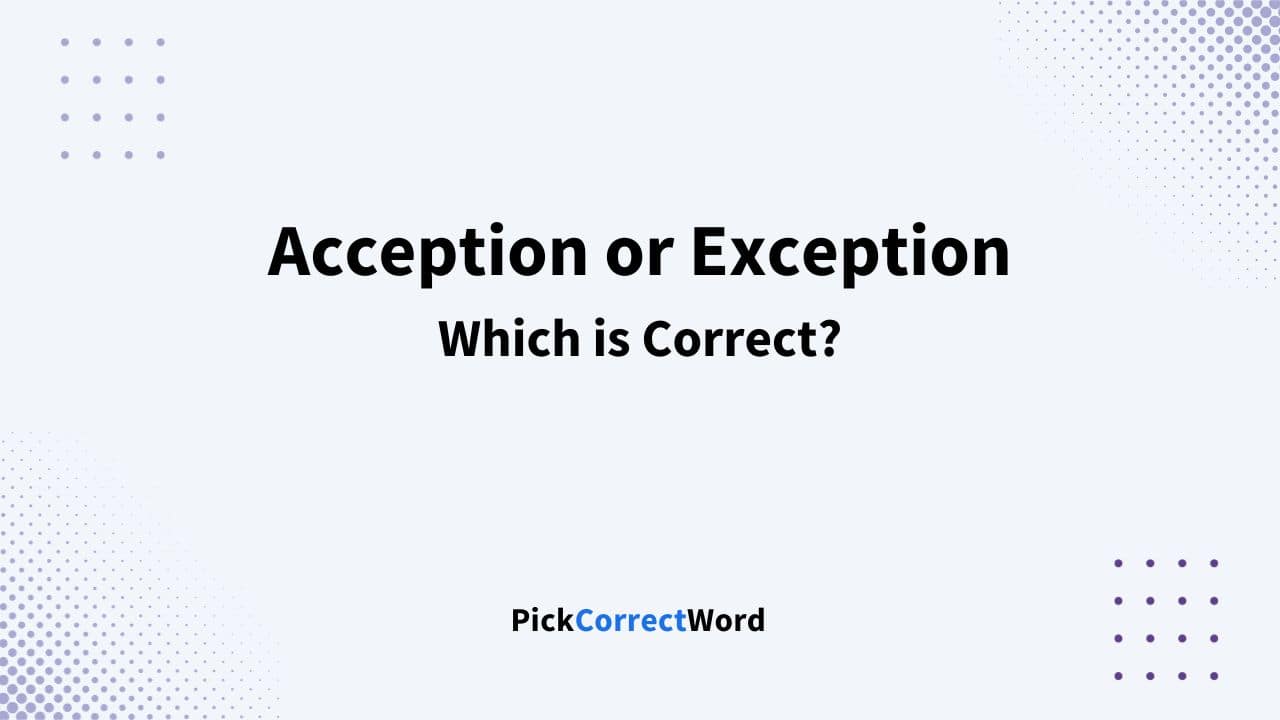It’s likely that you use the word ‘exception’ every once in a while. But when you write it down, it’s easy to get the word wrong.
The words ‘acception’ and ‘exception’ sound a lot alike, which can make them hard to tell apart when you’re writing.
However, between acception or exception, the correct spelling is ‘exception.’
On the other hand, acception is an old, out-of-use word that means ‘acceptance’ or ‘reception.’ However, it’s no longer acknowledged as a standard English word.
Acception or exception: What is the correct spelling?
The correct spelling is exception.
While both words exception and acception may sound similar(homophones), exception is the term to use when you want to talk about something unique or different.
Meaning and correct spelling
The word exception refers to something that is not included within a rule or a general statement.
- For example, If there’s a rule that everyone must attend a meeting, someone very ill might be an exception to this rule.
On the other hand, acception is an outdated word that you won’t see used in modern English. It used to mean favoritism or preference, but it’s not recognized as a correct word anymore.
Here is a simple table to clarify:
| Usage | Word | Meaning |
| Current | Exception | Something or someone that does not follow a general rule |
| Outdated | Acception | Acceptance of something or someone |
Use of the word in Different Contexts
Grammatical context: The word ‘data’ is plural, but it is often treated as an exception in modern usage.
Exclusion context: Snow rarely occurs here in April; today was an exception.
Rule context: This coupon is valid on all items without exception.
Individual context: She was the only exception to the no-uniform rule on account of her recent achievements.
Examples of Sentences Using the Word “Exception”
“The teacher made an exception for John when he requested to submit his assignment late.“
“Despite being allergic to seafood, she made an exception on their date night and ordered a lobster dish.“
“All employees are required to clock in at 8 AM sharp; no exceptions will be tolerated.“
“Her academic record was excellent, with the exception of her performance in math.“
“The wedding had a strict dress code, but the bride made an exception for her elderly grandmother to wear something more comfortable.“
“The company policy stated that all employees must have a degree; however, they made an exception for Jane due to her exceptional skills and experience.“
“She was known to be very frugal with her money, with the exception of her weakness for designer bags.“
“The new diet plan excludes all dairy products, with the exception of yogurt.“
“All items are on sale this week except for a few select items, which are marked as exceptions in the flyer.“
“The driver was speeding and ran a red light; he was let off with a warning due to his clean driving history.“
Difference between the US and UK for the word ‘Exception‘?
There is no difference in how the word “exception” is spelled in British English and American English. There is no difference in how this word is spelled or used between these two variants of English.
However, it’s important to note that there may be slight variations in pronunciation due to regional accents.
Frequently Asked Questions
Can ‘exception’ be used to mean a one-time deviation from a rule?
In fact, the word “exception” can be used to describe a single time when a rule is not followed. Take this sentence as an example: “The company doesn’t normally let people work from home, but they made an exception for Jane because she got sick out of the blue.” In this case, a “exception” means a one-time break from the normal rule.
Is ‘exception’ always used to denote exclusion?
No, the word ‘exception’ can also be used to denote a deviation from a rule or norm. The context will determine its specific meaning.
Can ‘exception’ be used in both formal and informal contexts?
Yes, ‘exception’ is versatile and can be used in both formal and informal contexts. Its use depends more on the nature of the statement or rule from which something is being excluded.


